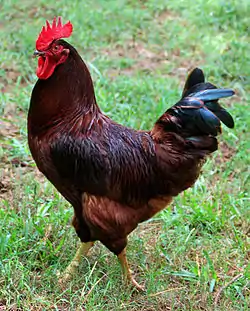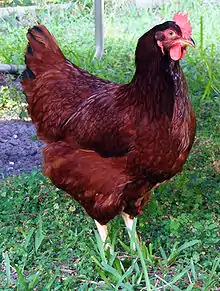 Rhode Island Red rooster | |
| Conservation status | Livestock Conservancy: watch[1] |
|---|---|
| Other names | Rhode Islands |
| Country of origin | United States |
| Use | dual-purpose |
| Traits | |
| Weight | |
| Skin color | yellow |
| Egg color | brown[2]: 70 |
| Comb type | single or rose |
| Classification | |
| APA | American[3] |
| EE | yes[4] |
| PCGB | soft feather: heavy[5] |
| |
The Rhode Island Red is an American breed of domestic chicken. It is the state bird of Rhode Island.[2]: 70 It was developed there and in Massachusetts in the late nineteenth century, by cross-breeding birds of Oriental origin such as the Malay with brown Leghorn birds from Italy. It was a dual-purpose breed, raised both for meat and for eggs; modern strains have been bred for their egg-laying abilities. The traditional non-industrial strains of the Rhode Island Red are listed as "watch" (medium conservation priority, between "recovering" and "threatened") by The Livestock Conservancy.[1] It is a separate breed to the Rhode Island White.[2]: 70
History

The Rhode Island Red was bred in Rhode Island and Massachusetts in the second half of the nineteenth century, by selective breeding of birds of Oriental origin such as the Cochin, Java, Malay and Shanghai with brown Leghorn birds from Italy. The characteristic deep red plumage derived from the Malay.[2]: 70 [6] The State of Rhode Island celebrated the centenary of the breed in 1954, when the Rhode Island Red Monument was raised at the William Tripp farm, in Little Compton, Rhode Island.[7]: 2
The name of the breed is ascribed either to Isaac Champlin Wilbour of Little Compton at an unknown date, or to a Mr. Jenny of the Southern Massachusetts Poultry Association in 1879 or 1880. In 1891 Nathaniel Borden Aldrich exhibited some as "Golden Buffs" in Rhode Island and in Philadelphia; they were first exhibited under the present name in 1895. They were previously also known as "John Macomber fowls" or "Tripp fowls."[8]: 11
The first breed standard was drawn up in 1898, and was approved by the American Rhode Island Red Club in Boston in 1901; the single-comb variety was admitted to the Standard of Perfection of the American Poultry Association in 1904,[7]: 8 and the rose-comb in 1906.[9]
Characteristics
The color of the plumage of the traditional Rhode Island red ranges from a lustrous deep red to almost black; the tail is mostly black.[2]: 71 The comb may be either single or rose-comb; it is vivid red, as are the earlobes and wattles.[2]: 71 The beak is a reddish horn color, the eyes are reddish bay, and the feet and legs are yellow, often with some red on the toes and sides of the shanks.[2]: 71 Industrial strains may be smaller and paler in color than the old-type breed.[6]
Use
The Rhode Island Red was developed as a dual-purpose breed, to provide both meat and eggs. Since about 1940, it has been selectively bred predominantly for egg-laying qualities, and the modern industrial Rhode Island Red is a layer breed.[6] Rhode Island Reds have been used in the creation of many modern hybrid breeds.
The traditional dual-purpose "old-type" Rhode Island Red lays 200–300 brown eggs per year, and yields rich-flavored meat.[6][10] It is included in the Ark of Taste of the Slow Food Foundation.[10]
References
- 1 2 Conservation Priority List. The Livestock Conservancy. Accessed February 2017.
- 1 2 3 4 5 6 7 8 9 Carol Ekarius (2007). Storey's Illustrated Guide to Poultry Breeds. North Adams, Massachusetts: Storey Publishing. ISBN 9781580176675.
- ↑ APA Recognized Breeds and Varieties: As of January 1, 2012. American Poultry Association. Archived 4 November 2017.
- ↑ Liste des races et variétés homologuée dans les pays EE (28.04.2013). Entente Européenne d’Aviculture et de Cuniculture. Archived 16 June 2013.
- ↑ Breed Classification. Poultry Club of Great Britain. Archived 12 June 2018.
- 1 2 3 4 Rhode Island Red - non-industrial chicken. The Livestock Conservancy. Accessed March 2019.
- 1 2 [Rhode Island Red Centennial Committee] (1954). A History of the Rhode Island Red, 1854-1954 (pamphlet). Rhode Island Development Council. Accessed October 2018.
- ↑ Dwight Edward Hale (1911). Standard-Bred Rhode Island Reds, Rose and Single Comb: Their Practical Qualities; the Standard Requirements; How to Judge Them; How to Mate and Breed for Best Results. Quincy, Illinois: Reliable Poultry Journal Publishing Company.
- ↑ Chickens. Poultry Club of Great Britain. Archived 9 November 2018.
- 1 2 "Old-Type" Rhode Island Red chicken. Slow Food Foundation for Biodiversity. Accessed February 2017.